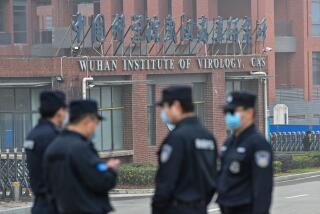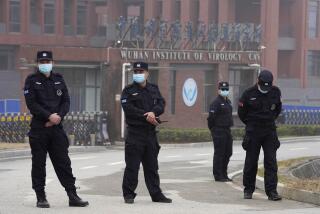Iraq Admits to Germ War Tests : Mideast: Government concedes there is a laboratory for such research. But it insists that experiments were stopped last fall for fear of U.S. bombing.
- Share via
NICOSIA, Cyprus — Iraq admitted Monday that its military scientists had experimented with germ warfare, but it insisted that the program was stopped last fall for fear of U.S. bombing.
President Saddam Hussein’s regime had previously denied accusations that it had or was developing biological weapons.
But Baghdad newspapers Monday carried a report from an unidentified Foreign Ministry spokesman conceding: “The Iraqi side has informed the (United Nations) inspection team that there is a laboratory for biological research for military purposes within a general research establishment.
“Iraq dropped this biological research completely in autumn, 1990, because of the possibility of an attack,” the report said. “There is (now) positively no biological activity for military purposes, for ammunition or for weapons-building.”
The United Nations quickly confirmed the report. At U.N. headquarters in New York, a statement from the office of Secretary General Javier Perez de Cuellar said, “Iraq has informed the U.N. inspection team that it has carried out biological research for defensive military purposes.”
The Iraqis said they had withheld the information until now “because it would have been misconstrued by the world at large,” the secretary general’s statement said.
Western intelligence agencies charged during the seven-month-long Persian Gulf crisis and war that Iraqi scientists were experimenting with anthrax and other biological toxins.
The abandonment of the program presumably came out of concern that toxic agents might be released within Iraq by allied bombing. Hussein’s army invaded Kuwait on Aug. 2, 1990, triggering the allied military attack in January that led with a massive air bombardment.
Carried in major government newspapers, the ministry report did not disclose the location of the research center, the date it was allegedly shut down or the type of experimentation. But the U.N. statement quoted Iraqi authorities as saying the research was started in 1986 at Salman Pak, a complex of laboratories 20 miles southeast of Baghdad.
The Iraqi government had insisted earlier that the Salman Pak laboratory had strictly civilian uses--to inspect food and to diagnose chemical and biological contamination. The U.N. inspectors, who have visited the site several times since they arrived in Iraq last Friday, reported that they had been hampered in their work by piles of unexploded ammunition on the site.
The disclosure was the latest in a string of Iraqi denials--and subsequent reversals--on its weapons capabilities, beginning with the initial U.N. demand that Baghdad reveal all its nuclear, chemical and biological weapons, as well as its long-range delivery systems, to comply with U.N. Security Council Resolution 687, which brought a formal cease-fire to the war in March. The cease-fire agreement, agreed to by Iraq, also requires destruction of the weapons.
The initial response by Hussein’s regime was that it had no nuclear or biological programs. It has backed down only grudgingly, and incrementally, after U.N. inspection teams began arriving in May to verify the Baghdad claims.
The world has known for some time that the Baghdad regime possessed chemical weapons, since Hussein’s military used nerve gas against Iraq’s Kurdish minority during the 1980-88 Iran-Iraq War and threatened to use missiles with chemical warheads against Israel during the Gulf War. But the extent of Iraq’s germ-warfare capability was not known.
Chemical and biological weapons can be used in bombs, missile warheads or artillery shells. Unlike chemical weapons such as nerve gas and mustard gas, which attack the skin, lungs or nervous system and can be fast-acting and extremely toxic, the slower-acting biological agents are used to spread disease by introducing toxins and microorganisms into humans. Anthrax, typhoid and bubonic plague are some of the diseases that can be caused by germ weapons.
The use of any type of chemical or germ weapon is forbidden by international law.
Iraqi compliance with the cease-fire resolution is required before the Security Council will lift the economic embargo on that country, ravaged by war and rebellion. Hussein and other officials of his Arab Baath Socialist Party regime have demanded that the embargo be raised to ease shortages of food and medicine. Meanwhile, however, they have disclosed their military secrets only under heavy pressure, including President Bush’s threat last month to resume the bombing if the Iraqi regime did not come clean.
On Friday, Secretary General Perez de Cuellar presented a plan to the Security Council that would indefinitely monitor all major military programs in Iraq and prohibit weapons of mass destruction.
Baghdad’s U.N. ambassador, Abdul Amir Anbari, said the proposed controls, strongly backed by Washington, would be “tantamount to putting Iraq into trusteeship status,” a backhanded admission that Hussein has been unable to erase international rejection of his regime after its disastrous defeat in the Gulf War.
Over the weekend, representatives at an Istanbul meeting of the 45-nation Organization of the Islamic Conference twice overwhelmingly rejected Baghdad’s bid for support in overturning the embargo, which deprives Hussein of billions of dollars in oil revenue annually.
According to reports from Baghdad on Monday, Iraqi officials claimed they had confirmed the existence of the germ-warfare lab to U.N. inspectors on Friday, when the first experts in biological weapons arrived in the country. Previous teams have attempted to examine the extent of Iraq’s nuclear, chemical and missile programs. The initial group, consisting of nuclear experts, arrived in May.
The secretary general’s statement said the inspection team, consisting of four U.N. officials and 24 experts from nine countries including the United States and the Soviet Union, was continuing its survey of possible biological warfare sites in Iraq.
David Kelly, chief inspector of the biological team, told reporters in Baghdad on Sunday that he was receiving “full cooperation” from the authorities and said Iraqi officials insisted that they had no germ-warfare weapons. He said nothing about the reported disclosure of the research lab.
Disclosure of biological experimentation came more promptly, but it followed the same pattern of Iraqi behavior toward the teams inspecting nuclear and chemical capabilities. It took nuclear inspectors nearly three months to express satisfaction that the government was revealing the bulk of its facilities, and some officials still say they have doubts.
The fourth nuclear-inspection mission is now under way. Previous ones were deceived and harassed by Baghdad authorities. At one point, some inspectors came under warning fire by an Iraqi convoy removing nuclear components from a research center.
After initially denying any except peaceful aims for its research program, Baghdad now concedes that it was developing the technology to manufacture weapons-grade uranium and had in fact produced some. The government said it had not disclosed the advances earlier because they were state secrets.
Similarly, U.N. teams checking Iraqi chemical-weapons stocks have reported that they are far larger than the initial inventory supplied to the United Nations by Baghdad authorities. The list turned over in April declared 12,000 or fewer chemical weapons, but in Baghdad last week Rolf Ekeus, the overall U.N. chief for the verification and destruction program, said his teams had discovered at least 46,000 chemical munitions--although some of that total was described as non-lethal tear gas.
On Saturday, the official Iraqi news agency quoted an unidentified government official as claiming that the difference in chemical weapons totals was the result of a “hurriedly prepared” list in April that included only what he called important items.
Ekeus told reporters he concluded that the new Iraqi figures are the result of Baghdad’s realization that the teams have “the capability to go and search very effectively.” But the government official contended that Ekeus’ report was distorted by the Western media, that the new numbers included “some unimportant and harmless raw materials,” and that the media was engaged in a campaign “to cast doubt on Iraq’s cooperation with the team and find pretexts for launching a new attack or continuing the economic blockade.”
Nearly every Iraqi denial appears to fly in the face of well-documented reports. On Saturday, for instance, Trade Minister Mohammed Mehdi Saleh, asked at a news conference about Kuwaiti goods that were looted by the Iraqi occupation force and then sold at high prices in Baghdad, replied:
“These food supplies and other items you mentioned were not looted. The private sector in Kuwait was free to sell whatever it liked. There were deals conducted by Iraqi and Kuwaiti businessmen. The government does not interfere with the private sector.”
Times staff writer Stanley Meisler in Washington contributed to this article.
BACKGROUND
The aim of toxic chemical and biological agents in warfare is to disable or destroy an enemy--either directly, or else indirectly through the reduction of the food supply. Among the chemical agents are nerve gases and botulin, a toxin that causes fatal botulism. Organisms of any type--viruses, bacteria or fungi--can be used in biological warfare. President Nixon renounced U.S. use of such arms in 1969. The U.N. General Assembly approved a treaty banning biological warfare in 1971.
More to Read
Sign up for Essential California
The most important California stories and recommendations in your inbox every morning.
You may occasionally receive promotional content from the Los Angeles Times.













